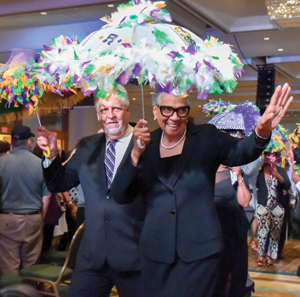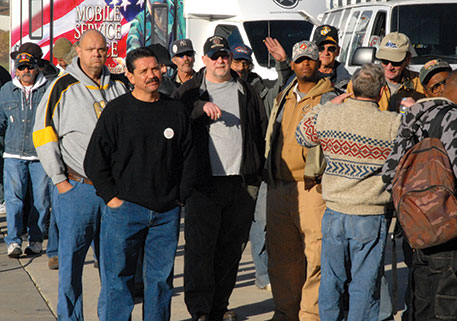2017 DAV National Convention sees first female national commander elected, first male elected to lead Auxiliary
 The 2017 DAV and Auxiliary National Convention made history, as members elected Delphine Metcalf-Foster the new DAV national commander—making her the first female veteran to assume the organization’s highest post and the first woman to command one of the nation’s big three veterans service organizations (VSOs).
The 2017 DAV and Auxiliary National Convention made history, as members elected Delphine Metcalf-Foster the new DAV national commander—making her the first female veteran to assume the organization’s highest post and the first woman to command one of the nation’s big three veterans service organizations (VSOs).
Addressing the convention, which was held July 29 to Aug. 1 in New Orleans, the retired Army first sergeant from California said she is humbled to make history. “But as I do,” she said. “I want to say that I don’t feel I ever wanted to be treated differently because of my gender.”
During her acceptance speech, Metcalf-Foster noted the qualities of DAV paralleled the Army credo.
“We put serving our fellow veterans first. We will not accept defeat. We will not quit, and most importantly, we will never leave a fallen comrade,” she said.
This year also marked the election of the Auxiliary’s first male national commander, Craig Johniken.
“There is an evolution happening among the caregivers of ill and injured veterans in this nation—it’s no longer just wives and mothers. And I am proud to stand up for all caregivers and fight for what our veterans have earned,” said Johniken.
Addressing the audience, Metcalf-Foster laid out her priorities to ensure DAV continues providing a lifetime of support to veterans and their families. Her main concerns include fighting for equitable benefits for caregivers of veterans injured before 9/11 and remaining the leading voice for the unique transition issues concerning our sisters-in-arms, returning women veterans.
“When a man or woman raises their hand and says, ‘Send me,’ when our nation calls, no one knows better than us that they’re writing a blank check to our country,” she said. “The ultimate payment could be their lives. For those who have sacrificed for our country and their survivors, we must insist on a strong VA and health care and benefits system to meet their needs.”
She also noted that the organization will march forward with new innovations surrounding the needs of returning veterans and their search for meaningful employment, and she intends to continue addressing subjects like access to quality health care, accurate and timely disposition of disability claims, and program improvements that strengthen the lives of veterans and their families.
Along with Metcalf-Foster’s election, convention delegates chose other senior leadership, including Senior Vice Commander Dennis Nixon, 1st Junior Vice Commander Stephen “Butch” Whitehead, 2nd Junior Vice Commander Donald Day, 3rd Junior Vice Commander Andy Marshall and 4th Junior Vice Commander Joseph Parsetich. Delegates also re-elected National Judge Advocate Michael Dobmeier and National Chaplain Michael Dover.
Newly elected Auxiliary national officers include Senior Vice Commander Ellen Timmerman, 1st Junior Vice Commander Diane Franz, 2nd Junior Vice Commander Lynn Prosser, 3rd Junior Vice Commander Carolyn Sensat, 4th Junior Vice Commander Julie Weissman-Steinbaugh and Judge Advocate Donna Adams.
Outgoing National Commander Dave Riley, in his final statements and report to the convention, reminisced on working alongside DAV members during Operation: Keep the Promise at this year’s mid-winter conference in February. He noted the tremendous work done by members and supporters on behalf of caregivers and women veterans during his time leading the organization.
“Thanks to you, DAV has a lot to be proud of. But there is still much more work to do,” he said. “It is incumbent on each of us to ensure DAV continues the mission and remains the thought leader on Capitol Hill.”
Riley also commended the efforts of those in the field working each day to ensure veterans receive their earned benefits. He took time during his remarks to praise the efforts of DAV’s chapter, department, transition and national service officers, as well as the chapter and department leaders, DAV Transportation Network drivers and all DAV volunteers.
“It has been my most profound honor and privilege to serve as your national commander. Thank you for placing this trust in me. In my mind, there is no finer group of men and women in our nation than our veterans and their families,” he said.
Throughout the convention, attendees were treated to addresses by the secretary of veterans affairs and acting VA undersecretary for health; a forum featuring the ranking member of the House Veterans’ Affairs Committee; special screenings of newly released films and documentaries focusing on veterans’ issues; a performance by Gary Sinise and the Lt. Dan Band; and gifts from A&W Restaurants.
Secretary of Veterans Affairs Dr. David J. Shulkin delivered remarks to DAV members during the joint opening session. The secretary spoke about the important role VSOs like DAV play.
“We really couldn’t do the work we’re doing without groups like you at DAV,” Shulkin said before noting the House of Representatives approved the VA Choice and Quality Employment Act by a vote of 414 to 0 the day prior.
The bill replenishes $2.1 billion in funding for the Veterans Choice Program and invests in key VA functions such as hiring medical center professionals more quickly; accurately tracking a growing number of vacancies; and authorizing leases for 28 major medical facilities, a long-awaited action that the department has asked Congress to address for years.
“It was really DAV and the other VSOs that made sure that we were doing the right things for veterans,” the secretary said. “DAV has always been there for us, and the work that you do is truly incredible.”
Shulkin then emphasized the VA’s efforts to become a more transparent department of government before laying out his top five priorities for the VA: providing veterans greater choice in health care, modernizing VA systems and infrastructure, improving timeliness of services, focusing VA’s resources more efficiently, and preventing suicides.
“I believe the way that we’re going to fix this system is by being honest and open about where our problems are,” he said. “Because if you don’t talk about where your problems are, then you can’t really begin to start finding the right solutions to solve those problems and work with groups like yours.”
Shulkin noted there has been a 46 percent increase in community care appointments since the beginning of the year and a 64 percent reduction in wait times since 2014—a statistic being published online for every VA facility in the nation in an effort to be more transparent and accountable to veterans and the American public. He also said that same-day primary care services are now available at every VA medical center, and urgent mental health services have been extended to veterans with other-than-honorable discharges.
Following the joint opening session, acting VA Undersecretary for Health Dr. Poonam Alaigh spoke during the VA Health Care Update Seminar about strengthening the Veterans Health Administration (VHA) and rebuilding the nation’s largest integrated health care system to improve access and quality of care for veterans. Alaigh has been a physician in the New Jersey VA system for more than a decade.
“That’s where I have my true calling,” she said. “It was and is with the veterans that I feel grounded. I feel gratified, and I feel so honored and privileged in terms of taking care of my veterans.”
Alaigh echoed the secretary’s comments from earlier in the day concerning DAV’s involvement in the process of reforming the VA.
“As we move into different policy decisions or different kinds of discussions, we change what we do at the VA as a result of the input we get from you. DAV represents such a strong voice in terms of what veterans’ needs are, in terms of what you care about, in terms of sometimes our not truly understanding the whole picture,” she said. “You truly are a strong organization, and we need you to continue the strong collaboration that we have together.”
Alaigh noted that suicide prevention is the VHA’s top clinical priority.
“There is no veteran who should feel so lonely, so helpless, so hopeless that he or she resorts to taking his or her life,” she implored. “That should never happen.”
Part of the VHA’s effort to eradicate veteran suicide is getting to veterans at key access points such as the Veterans Crisis Line, which now has a call rollover rate of less than 2 percent, with calls being answered within eight seconds on average. Alaigh credited these improvements to the VA’s modernization efforts, which also include the VHA’s merging of medical records with the Department of Defense’s system in order for VA doctors to look at patients’ medical histories from the dates they entered military service to present day.
Another VA modernization effort Alaigh touched on was telehealth, which allows patients to visit with their primary care physicians through the internet.
“We are a leader in telehealth,” Alaigh said. “We were one of the first organizations that started rolling out telehealth as a means to be able to take care of the needs of our veterans.”
The VA saw more than 2 million telehealth visits in 2016 and found that 70 percent of in-person visits could be eliminated through the program. As such, the VA is working to establish the secure VA Video Connect platform for patients to use in the future.
Ranking member of the House Veterans’ Affairs Committee Rep. Tim Walz then took part in a moderated discussion that spanned many of the current issues surrounding veterans. The forum was led by National Legislative Director Joy Ilem and National Service Director Jim Marszalek and included a Q&A session.
Walz was joined by Past National Commander and current Deputy Assistant Secretary for Disability Assistance at the Veterans Benefits Administration Rob Reynolds, and Dr. Skye McDougall, director of the VHA’s South Central VA Health Care Network. Discussion also touched on the importance of having DAV at the table when discussing the new Choice legislation.
“None of that would have happened without this organization coming to the table,” Walz said. “We need to help educate those 93 percent of Americans who never served at all, and those 99 percent who haven’t served in these current conflicts, that there’s not a simple fix to this. The idea that you’re just going to give someone a card, and they’re going to manage their own care and go wherever they want, seems like the exact right thing to do. And it seems like you’re really supporting veterans when you say that. But most (veterans) know that creates incredible problems.”
As part of the convention’s evening activities, members were once again treated to the entertainment of longtime DAV friend Gary Sinise and the Lt. Dan Band during Fun Night. A favorite among members, the band did not disappoint, filling the ballroom with their high-energy style.
Convention attendees were also invited to three film screenings that provided a cinematic look into issues impacting disabled veterans and their loved ones. “God Bless the Broken Road” premiered Friday evening, and attendees learned about the service and sacrifice of a young mom struggling to raise her daughter alone after losing her husband in Afghanistan. The movie weaves faith, country music and stock car racing on the big screen, while paying tribute to veterans and the difficult journey that many face. Two actors featured in the film, Lindsay Pulsipher and Gary Grubbs, attended the event and stressed the importance of highlighting the veteran voice in film. DAV ambassadors Jordin Sparks, a singer and actress, and NFL Hall of Famer LaDanian Tomlinson were also featured in the movie. The film’s producers and directors showcased DAV in the movie and made the organization a beneficiary of its success.
During Monday’s Women Veterans Seminar, members took a look into the changing roles of females serving in Iraq and Afghanistan and their transition following deployment with “Journey to Normal: Women of War Come Home.” The documentary explores the psychological and social dynamics facing servicewomen, as well as their reintegration into civilian life. The Women Veterans Interim Committee discussed issues facing women veterans highlighted in the film with the filmmaker JulieHera DeStefano.
Monday evening, convention attendees had the opportunity to see the official unveiling of a film that profiled an issue of importance to DAV and DAV Auxiliary members—the silent sacrifices of caregivers. Filmed over five years, “The Weight of Honor” follows the lives of the caregivers of veterans who were severely wounded in Afghanistan. Yvonne Riley, wife of the outgoing national commander, joined her husband on stage while he introduced the film and outlined DAV’s commitment to expanding benefits and resources that are currently only available to post-9/11 veteran caregivers. Stephanie Seldin Howard, the film’s director and producer, addressed questions from the group and recognized DAV’s work in addressing the needs of caregivers through the Unsung Heroes Initiative.
A&W Restaurants also announced their new partnership with DAV, as Vice President of Marketing Sarah Blasi presented DAV a check for $100,000. The company has been a supporter of veterans since serving their first root beer during a welcome-home parade for World War I veterans in 1919. A&W Restaurants collected donations nationwide, leading up to National Root Beer Float Day on Aug. 6, and convention participants were able to celebrate early with root beer floats courtesy of A&W following the opening business session.
DAV also presented a $620,000 check to Camp Corral, a nonprofit organization that provides free, one-of-a-kind summer camp experiences for children of wounded, disabled or fallen military service members. The funds, which were raised by chapters, departments and the Auxiliary through DAV’s Just B Kids Scholarship Program and then matched by the national organization, will allow 1,000 children to attend the camps.
The 97th DAV and Auxiliary National Convention will convene July 14–17, 2018, at the Grand Sierra Resort and Casino in Reno, Nev.





